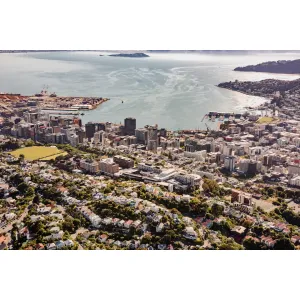
A guide to living in New Zealand
One of the biggest factors to consider when emigrating to New Zealand is what it is like to live here. The people, weather, housing, food and prices will all Influence your perception and enjoyment of what it is to live in New Zealand.
New Zealand's population
 New Zealand has a population of only around 5 million people. To put that into perspective, that is about half the total population of London, with a land mass of almost the same size as the United Kingdom (243,O00km2 for the UK, 270,000km2 for New Zealand). Breaking those figures down, we can see that the New Zealand population density is vastly different from the United Kingdom average, at 16 people per square kilometre, compared to 255 people per square kilometre in the UK. This figure ranks New Zealand at 202nd out of 241 countries worldwide on population density. This is generally a favourable statistic if you like wide open spaces, fresh air and finding places with natural beauty and low or no levels of population.
New Zealand has a population of only around 5 million people. To put that into perspective, that is about half the total population of London, with a land mass of almost the same size as the United Kingdom (243,O00km2 for the UK, 270,000km2 for New Zealand). Breaking those figures down, we can see that the New Zealand population density is vastly different from the United Kingdom average, at 16 people per square kilometre, compared to 255 people per square kilometre in the UK. This figure ranks New Zealand at 202nd out of 241 countries worldwide on population density. This is generally a favourable statistic if you like wide open spaces, fresh air and finding places with natural beauty and low or no levels of population.
In reality, what this means is that within towns and cities, queuing in shops and petrol stations is rare and places are not commonly overcrowded. If you leave the towns and cities behind, you can drive for miles without ever seeing another car. You can drive away from civilisation and find a beach, sit and read for hours on end without being disturbed by other people. You can go camping, truly in the wild, with only yourselves and the belongings you bring with you to keep you company. It's a strange feeling that certainly isn't for everybody, but most will be able to appreciate the level of serenity and peace the country offers because of this very low population density.
Where to live in New Zealand
 If you are unsure as to what region of New Zealand to start your search for a house In, primarily you will have to consider study opportunities and later on employment positions, as depending on what your speciality is, there could be a higher chance of finding work in the North Island around one of the urban areas such as Auckland or Wellington.
If you are unsure as to what region of New Zealand to start your search for a house In, primarily you will have to consider study opportunities and later on employment positions, as depending on what your speciality is, there could be a higher chance of finding work in the North Island around one of the urban areas such as Auckland or Wellington.
However, house prices are a little in the North Island than the South Island, generally speaking. With that being said, Christchurch on the South island has become very popular with migrants over the years. While this has been partly due to the lower living costs, it is also a much quieter, more tranquil part of the country which favours those seeking a more peaceful, relaxing life, with some truly stunning landscapes,
Housing is a part of New Zealand that comes as a bit of a shock to most newcomers, as the materials that are commonly used to build houses in the country are very different from those used In Europe and North America. It is true that houses are built to very different financial limitations In New Zealand and the priorities of home owners are not quite the same as of those in Europe or the US. Accepting these facts is the first step in understanding the nature of the New Zealand housing market, as you must realise that there may not be a property that will meet all of the needs you first decided upon before you knew what was available.
With this in mind, it is important to point out that this does not mean you should expect poor quality housing, poor workmanship or inferior materials ; in fact, it just means that your budget might not go as far in New Zealand as it did in your home country due to the development of the housing market, demand and the evolution of the New Zealand economy.
 House prices in New Zealand's more desirable areas are constantly on the up, with average prices in some areas, such as the currently very fashionable Horne Bay suburb of Auckland, pushing up to NZ$2m. Currently, average house prices in Auckland in general are around $900,000.
House prices in New Zealand's more desirable areas are constantly on the up, with average prices in some areas, such as the currently very fashionable Horne Bay suburb of Auckland, pushing up to NZ$2m. Currently, average house prices in Auckland in general are around $900,000.
For new migrants moving here with some financial assets, it can mean that purchasing property in the country will take some research, and, in turn, can also end up being a low risk but very beneficial short-term investment with potentially high realised gains. If you are on a tight budget however, then it would be advisable to look for property within other, less prized areas that are "on the up’'.
Cost of Living and Affordability
The cost of living in New Zealand varies depending on the city or region you choose to study in. Auckland, the largest city, tends to be more expensive, while other cities like Christchurch or Hamilton offer more affordable living options.
On average, students need between NZD 20,000 – 27,000 per year to cover living expenses, including accommodation, food, transport, and entertainment. Many students work part-time (up to 20 hours per week during the semester and full-time during holidays) to help manage costs and more importantly to gain New Zealand work experience.
Diverse and Safe Living Environment
New Zealand is known for its safe, inclusive, and multicultural society. The country consistently ranks high in global safety indexes, making it an ideal destination for international students. The people, known as Kiwis, are friendly and welcoming, and the culture values diversity and respect.
International students can enjoy a balance between study and leisure, as New Zealand offers a relaxed lifestyle with plenty of outdoor activities such as hiking, skiing, and water sports. Cities like Auckland, Wellington, Christchurch, and Dunedin provide vibrant urban experiences, while smaller towns offer a more peaceful and close-knit student life.
Food in New Zealand
New Zealand cuisine is very much influenced by, as you would expect, locally-produced Ingredients and seasonal variations on these ingredients, Due to the location of the country and foreign immigration over the |ast 150 years, traditional Maori| cuisine is a|so influenced by British tastes, as well as Australian, Asian and American palates.
 When the Maori first arrived in New Zealand, they brought with them Food plants such as sweet potato and taro and, due to the abundance of marine life and certain traditional hunting restrictions, their diets generally revolved around these ingredients. However, once the British began to migrate to the country, along with other European and Asian nationalities, their palates adjusted to incorporate these new influences.
When the Maori first arrived in New Zealand, they brought with them Food plants such as sweet potato and taro and, due to the abundance of marine life and certain traditional hunting restrictions, their diets generally revolved around these ingredients. However, once the British began to migrate to the country, along with other European and Asian nationalities, their palates adjusted to incorporate these new influences.
Today, New Zealand cuisine is a mix of all these influences, though predominantly traditional meals consist of British influenced Maori dishes such as the classic boil—up, consisting of potatoes, pork, dumplings and kumara, and Pork and Puha (which is similar to a boil-up but containing puha; a type of watercress). Other popular dishes include casseroles, stews and seafood pies.
Food produced locally, such as lamb or dairy product which New Zealand is famous for, is produced from green grass fed pastures. The nutritional quality is very different (superior) to the grain fed animals from North America and Europe. You will taste the difference over a beer and barbecue.
The weather in New Zealand
Another significant element to consider is the weather. Many people without any experience of these places believe that countries within Australasia or Oceania regions are blessed with year-round run, mild winters and only enough rainfall to water the plants every now and then. Now, while that may be true in certain parts of central Australia, for New Zealand this is categorically not the case. New Zealand is approximately 1400 miles from Australia, to the south east, meaning that the weather there is a little less forgiving than that experienced In Australia.
In more specific terms, New Zealand experiences an oceanic climate (also known as a maritime climate), which is very similar to the United Kingdom, south-western South America and most parts of Europe. Countries with this kind of climate generally experience warm summers and cool winters (neither overly hot nor cold throughout the year), with a narrow annual range of temperatures during a single year. However, different specific regions of New Zealand can experience very different types of climate; Central Otago, for example, is said to be semi-arid, while around Northland the climate is more subtropical.
 Being an island nation located deep in the Pacific Ocean, New Zealand is very open to the elements and is blessed or punished, depending on your outlook, with year-round rainfall. Average rainfall recorded in cities In New Zealand ranges from around 250mm in Christchurch on the South Island, to 1,500mm in Whangarei on New Zealand's North Island. Areas around the Southern Alps on Ehe South Island enjoy as much as 6,700mm of rainfall per year; an average base'd on data taken from 2007 —20 1 In terms of sun, you can expect around 2,000 hours of sunlight per year in most places, with temperatures in the summer reaching 25-30 (possibly even 35) degrees Celsius. temperatures in winter on the North Island hover around 10-15 degrees Celsius, while on the south island, expect not only much cooler temperatures, but also regular snowfalls (something that is extremely rare on the north island).
Being an island nation located deep in the Pacific Ocean, New Zealand is very open to the elements and is blessed or punished, depending on your outlook, with year-round rainfall. Average rainfall recorded in cities In New Zealand ranges from around 250mm in Christchurch on the South Island, to 1,500mm in Whangarei on New Zealand's North Island. Areas around the Southern Alps on Ehe South Island enjoy as much as 6,700mm of rainfall per year; an average base'd on data taken from 2007 —20 1 In terms of sun, you can expect around 2,000 hours of sunlight per year in most places, with temperatures in the summer reaching 25-30 (possibly even 35) degrees Celsius. temperatures in winter on the North Island hover around 10-15 degrees Celsius, while on the south island, expect not only much cooler temperatures, but also regular snowfalls (something that is extremely rare on the north island).
What this means is that, generally speaking, the climate Is very similar to most parts of Europe, but there are areas which have more extreme climates, and as such within those areas you can expect more extreme weather patterns.
Summary
New Zealand offers a unique study experience, blending top-quality education with an exceptional lifestyle. With world-class universities, a welcoming environment, and breathtaking natural scenery, it is a perfect destination for students seeking both academic success and adventure and the immigration systems offers generous pathways to permanent residency.